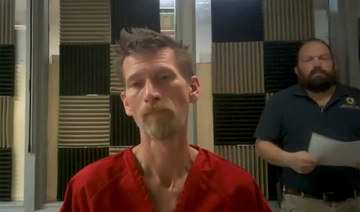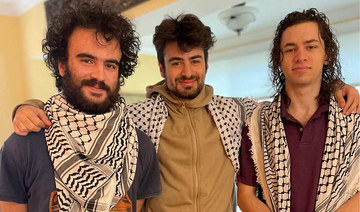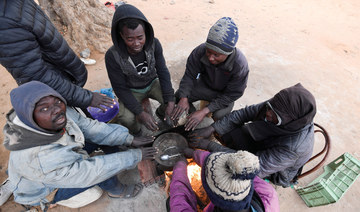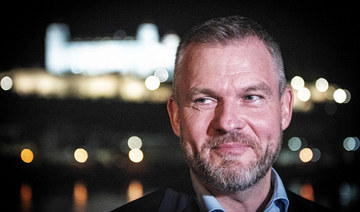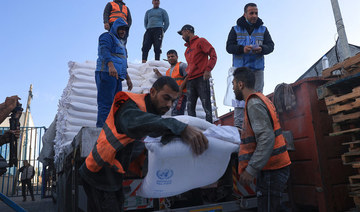BURLINGTON, USA: Vigils for three college students of Palestinian descent who were shot in Vermont over the weekend prompted calls for authorities to recognize the violence as a hate crime, and for unity among the Jewish and Arab communities.
Jason J. Eaton, 48, was arrested and held without bail on three counts of attempted murder. A not guilty plea was entered on his behalf on Monday.
The US Department of Justice, along with Vermont authorities, are still investigating whether Saturday’s gunfire on a Burlington street was a hate crime amid an increase in threats against Jewish, Muslim and Arab communities across the US since the Israel-Hamas war began, Attorney General Merrick Garland said. “There is understandable fear in communities across the country,” he said.
One vigil was held Monday night at Brown University in Rhode Island, where one of the victims, Hisham Awartani, is a student. Participants shouted at school president Christina Paxson as she addressed the crowd, demanding that Brown divest from investments that support Israel, according to media reports.
Robert Leikend, New England regional director for the American Jewish Committee, called for unity and finding common ground between the Jewish and Arab communities, saying in a statement Monday night that “hate should not beget more hate.”
He said a vigil after Eaton’s arrest “featured anti-Israel and antisemitic statements from some participants.” He didn’t name the location.
“The anger is understandable. The finger-pointing is not,” he said.
The vigil at Brown was closed to media. NBC News reported that Awartani said in a statement read by a professor that as much as he appreciates the love and support of the community, “I am but one casualty in a much wider conflict.”
The statement read, “Had I been shot in the West Bank, where I grew up, the medical services which saved my life here would have likely been withheld by the Israeli army. The soldier who would have shot me would go home and never be convicted.”
Awartani, Kinnan Abdalhamid and Tahseen Ali Ahmad, all age 20, were spending their Thanksgiving break in Burlington, and were out for a walk while visiting one of the victims’ relatives when they were confronted by a white man with a handgun, police said. The victims were speaking in a mix of English and Arabic and two of them were also wearing the black-and-white Palestinian keffiyeh scarves when they were shot, Police Chief Jon Murad said.
Abdalhamid told police he ran away, jumped a fence, and hid behind a house. He eventually knocked on another door, begging the woman who answered to call 911. At that point, he sat down, felt pain, and saw blood, according to an affidavit.
Two of the students were struck in their torsos, while one was hit in the lower body, Murad said. All three were being treated at the University of Vermont Medical Center, and one faces a long recovery because of a spinal injury, a family member said.
One of the students has been released from the hospital, according to media reports.
“I’ve been with them almost constantly since Saturday evening. I’ve been listening to them talk to one another and try to process the events, and I’m blown away by their resilience, by their good humor in the face of these difficult times,” said Rich Price, Awartani’s uncle.
The three have been friends since first grade at Ramallah Friends School, a private school in the West Bank, and all are “remarkable, distinguished students,” said Rania Ma’ayeh, head of the school.
Awartani is studying mathematics and archaeology at Brown; Abdalhamid is a pre-med student at Haverford College in Pennsylvania; and Ali Ahmad is studying mathematics and IT at Trinity College in Connecticut, Ma’ayeh said. Awartani and Abdalhamid are US citizens while Ali Ahmad is studying on a student visa, Ma’ayeh said.
Abdalhamid’s uncle Radi Tamimi, said at a news conference Monday his nephew grew up in the West Bank and “we always thought that that could be more of a risk in terms of his safety and sending him here would be a right decision.
“We feel somehow betrayed in that decision here and we’re just trying to come to terms with everything,” he said.
Eaton moved to Burlington over the summer from Syracuse, New York, and legally purchased the gun used in the shooting, Murad told reporters. According to a police affidavit, federal agents found the gun in Eaton’s apartment on Sunday. Eaton came to the door holding his hands, palms up, and told the officers he’d been waiting for them.
Eaton’s mother, Mary Reed, told the Daily Beast that Eaton, who had held various jobs as a farmer, ski instructor and researcher, had struggled with mental health issues, including depression. But she said he was in “such a good mood” when she saw him on Thanksgiving.
Syracuse police said Eaton’s name appeared in 37 police reports from 2007 until 2021, but never as a suspect. The cases ranged from domestic violence to larceny, and Eaton was listed as either a complainant or victim in 21 reports, according to Lt. Matthew Malinowski, the department’s public information officer.
Sarah George, state’s attorney, said that law enforcement officials do not yet have evidence to support a hate crime charge, which under Vermont law must be proven beyond a reasonable doubt. But, she said, “I do want to be clear that there is no question that this was a hateful act.”
Demonstrations have been widespread and tensions in the US have escalated as the death toll rises in the Israel-Hamas war. A fragile cease-fire between Israel and Hamas was set to continue for two more days past Monday as 11 more hostages were handed over to the Red Cross in Gaza under what was originally a four-day truce deal.
Authorities face calls to declare a hate crime in Vermont shooting of 3 men of Palestinian descent
https://arab.news/6spun
Authorities face calls to declare a hate crime in Vermont shooting of 3 men of Palestinian descent
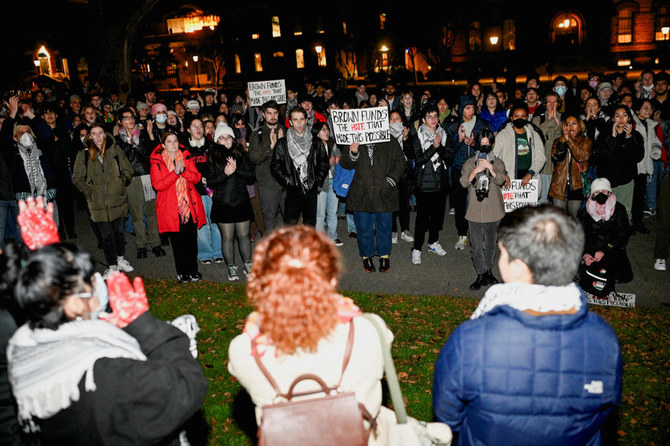
- Jason J. Eaton, 48, was arrested and held without bail on three counts of attempted murder
- The US Department of Justice, along with Vermont authorities, are still investigating whether Saturday’s gunfire on a Burlington street was a hate crime
Ukraine says it has checked Russia’s offensive in a key town, but Moscow says it will keep pushing

Six people were injured Thursday in one Russian daylight attack on Vovchansk using cluster munitions, local officials said
KYIV: Ukrainian units locked in street battles with the Kremlin’s forces in a key northeastern Ukraine town have halted the Russian advance, military officials in Kyiv claimed Thursday, though a senior Moscow official said the frontline push had enough resources to keep going.
Russian attempts to establish a foothold in the town of Vovchansk, which is among the largest towns in Ukraine’s northeastern Kharkiv region with a prewar population of 17,000, “have been foiled,” Ukraine’s general staff said in a midday report.
It was not possible to independently verify the claim.
Six people were injured Thursday in one Russian daylight attack on Vovchansk using cluster munitions, local officials said, as emergency workers and volunteers were rescuing people affected by shelling. Among the injured were two medics, he said.
Ukrainian authorities have evacuated some 8,000 civilians from the town. The Russian army’s usual tactic is to reduce towns and villages to ruins with aerial strikes before its units move in.
Vovchansk, located just 5 kilometers (3 miles) from the Russian border, has been a hotspot in the fighting in recent days. Russia launched an offensive in the Kharkiv area late last week, significantly adding to the pressure on Ukraine’s outnumbered and outgunned forces which are waiting for delayed deliveries of crucial weapons and ammunition from Western partners.
Russia has also been testing defenses at other points along the roughly 1,000-kilometer (620-mile) front line snaking from north to south through eastern Ukraine. That line has barely changed over the past 18 months in what became a war of attrition. Recent Russian attacks have come in the eastern Donetsk region, as well as the Chernihiv and Sumy regions in the north and in the southern Zaporizhzhia region. The apparent aim is to stretch depleted Ukrainian resources and exploit weaknesses.
Ukraine has repeatedly tried to strike behind Russian lines, often using drones though Russia’s response to the new technology used in unmanned vehicles has improved in recent months.
Russian naval aircraft Thursday destroyed 11 Ukrainian sea drones heading toward annexed Crimea in the western Black Sea, Russia’s Defense Ministry said, according to state news agency TASS.
Kyiv made no comment.
Ukrainian President Volodymyr Zelensky met with his top military commanders in Kharkiv on Thursday and said the region “is generally under control.” However, he acknowledged on social media that the situation is “extremely difficult” and said Ukraine was again strengthening its units in Kharkiv. Zelensky also met with wounded soldiers and handed out medals.
“We clearly see how the occupier is trying to distract our forces and make our combat work less concentrated,” he said in his nightly video address Wednesday.
Former Russian defense minister and now the head of the presidential Security Council Sergei Shoigu insisted Russian troops are pushing the offensive in many directions and that “it’s going quite well.”
“I hope we will keep advancing. We have certain reserves for the purpose, in personnel, equipment and munitions,” he said in televised remarks.
The Institute for the Study of War, a Washington-based think tank, calculated that Russian forces attacking in Kharkiv have advanced no more than 8 kilometers (5 miles) from the shared border.
It reckons Moscow’s main aim in Kharkiv is to create a “buffer zone” that will prevent Ukrainian cross-border strikes on Russia’s neighboring Belgorod region.
US Secretary of State Antony Blinken, in a two-day visit to Kyiv this week, sought to reassure Ukraine of continuing American support. He announced a $2 billion arms deal, with most of the money coming from a package approved last month.
Ukrainian officials say their needs are urgent, and Western partners have vowed to expedite deliveries of military hardware.
NATO Military Committee Chair Rob Bauer on Thursday urged senior officers from the 32-nation alliance to send more arms and ammunition to Ukraine, even if that means ignoring weapons stock guidelines.
“If faced with a choice between meeting the NATO capability targets or supporting Ukraine, you should support Ukraine,” he told a meeting of top defense brass in Brussels. “Stocks can and will be replenished. Lives lost are lost forever.”
Denmark is donating an extra 5.6 billion kroner ($814 million) to Ukraine, Danish Foreign Minister Lars Løkke Rasmussen said Thursday, with half going to air defense systems.
Meanwhile, Russian President Vladimir Putin sought to consolidate ties with China with an official visit to Beijing.
China has backed Russia diplomatically over its invasion of Ukraine and is now an important export market for Russian oil and gas. Moscow also has turned to Beijing for high-tech products.
Greece rescues 42 migrants off Crete, searches for three missing

- The migrants were rescued by commercial vessels and a Greek navy helicopter some 27 nautical miles southwest of Crete
- It was not clear what happened to their boat
ATHENS: Greece rescued 42 migrants off the island of Crete and was looking for three believed to be missing after their boat sent a distress signal while at sea, the Greek coast guard said on Thursday.
A coast guard official said the migrants were rescued by commercial vessels and a Greek navy helicopter some 27 nautical miles southwest of Crete.
It was not clear what happened to their boat, the official told Reuters on condition of anonymity, adding that a search and rescue operation for the missing was under way.
The island of Crete and its tiny neighbor Gavdos, Europe’s southernmost tip, have seen a surge in arrivals of migrants looking to cross to Europe from Libya in recent months.
The Greek government has pledged money and staff to help the ill-equipped islands handle the situation.
Greece has been a favored gateway to the European Union for migrants and refugees from the Middle East, Africa and Asia since 2015 when nearly 1 million people landed on its islands, causing an unprecedented humanitarian crisis. Thousands of others have died at sea.
Until recently, migrants had preferred islands further east near Turkiye over Crete and Gavdos.
Slovakia PM Fico’s fate remains in balance after surgery, deputy PM says

- The shooting was the first major assassination attempt on a European political leader for more than 20 years
- "Unfortunately, I cannot say yet that we are winning (the battle to save Fico) or that the prognosis is positive," Deputy Prime Minister Robert Kalinak said
BRATISLAVA: Slovakia’s Prime Minister Robert Fico remains in a serious condition and it is too soon to say whether he will recover, a deputy prime minister said on Thursday, a day after an assassination attempt that has sent shock waves across Europe.
The shooting was the first major assassination attempt on a European political leader for more than 20 years, and has drawn international condemnation. Political analysts and lawmakers say it has exposed an increasingly febrile and polarized political climate both in Slovakia and across Europe.
“Unfortunately, I cannot say yet that we are winning (the battle to save Fico) or that the prognosis is positive because the extent of the injuries caused by four gunshot wounds is so extensive that the body’s response will still be very difficult,” Deputy Prime Minister Robert Kalinak said.
Interior Minister Matus Sutaj Estok, speaking at the same news conference, said the shooter — whom police have charged with attempted murder — had acted alone and had previously taken part in anti-government protests.
“This is a lone wolf who had radicalized himself in the latest period after the presidential election (in April),” Sutaj Estok said.
The suspect listed government policies on Ukraine and its plans to reform the country’s public broadcaster and dismantle the special prosecutor’s office as reasons for the attack, the interior minister added.
Miriam Lapunikova, director of the F.D. Roosevelt University Hospital in Banska Bystrica where Fico is being treated, said the 59-year-old prime minister had undergone five hours of surgery with two teams to treat multiple gunshot wounds.
“At this point his condition is stabilized but is truly very serious, he will be in the intensive care unit,” she told reporters.
Slovak President Zuzana Caputova called for a calming of political tensions. Fico ally and President-elect Peter Pellegrini urged parties to suspend or tone down their campaigning for next month’s European Parliament elections.
“If there is anything the people of Slovakia urgently need today, it is at least a basic consensus and unity among Slovaks’ political representatives,” said Pellegrini, who won an April election for the mainly ceremonial post of president.
VETERAN LEADER
Fico has dominated Slovak politics for much of the past two decades, winning re-election last October for a fourth stint as premier.
He has fused left-leaning economic views with nationalism, tapping into widespread discontent over living standards, but has also proved a divisive figure. His critics say new reforms threaten the rule of law and media freedoms in Slovakia, a member state of the European Union and NATO.
Fico’s calls for ending sanctions on Russia and halting arms supplies to Ukraine have endeared him to Moscow, and President Vladimir Putin and other Russian politicians have been prominent among those condemning Wednesday’s assassination attempt.
Fico was shot while greeting supporters in the street after chairing a government meeting in the central town of Handlova.
Slovak news media reported that the 71-year-old gunman was a former security guard at a shopping mall, the author of three collections of poetry and a member of the Slovak Society of Writers. News outlet Aktuality.sk cited the suspect’s son as saying his father was the legal holder of a gun license.
There has been no official confirmation of the gunman’s identity and background.
The incident raised questions over Fico’s security arrangements, as the attacker managed to fire five shots at point blank range despite the prime minister being accompanied by several bodyguards.
In an undated video posted on Facebook, the alleged attacker was seen saying: “I do not agree with government policy” and criticizing government plans to revamp the public broadcaster.
Reuters verified the person in the video matched images of the man arrested after Fico’s shooting.
Fico and his government coalition allies have criticized sections of the media and the opposition, saying they had inflamed tensions in the central European state.
Slovakia’s biggest opposition party, the liberal, pro-Western Progressive Slovakia, was quick to condemn the shooting and called off a protest rally planned for Wednesday evening. It has also urged all politicians to avoid stoking tensions.
Russian tycoon Deripaska calls latest US sanctions ‘balderdash’

- “I strongly believe that we need to do everything we can to establish peace, not serve the interests of warmongers,” Deripaska said
- Since Russia’s invasion of Ukraine, Deripaska has been sanctioned by Britain for his alleged ties to Putin
FRANKFURT: Russian tycoon Oleg Deripaska dismissed the latest US sanctions on a series of companies that the US Treasury said were connected to a scheme to evade sanctions and unlock frozen shares as nonsense.
“This balderdash isn’t worth the time,” Deripaska said by message via a spokesperson in response a Reuters request for comment about the latest US sanctions.
“While the horrific war in Europe claims hundreds of thousands of lives every year, politicians continue to engage in their dirty games. I strongly believe that we need to do everything we can to establish peace, not serve the interests of warmongers,” he said.
The US Treasury on Tuesday announced it had sanctioned a web of Russian companies it said were being used to disguise ownership of a $1.6 billion industrial stake controlled by Deripaska.
Austria’s Raiffeisen Bank International was planning to buy the stake and dropped the transaction following mounting US pressure to abort the bid.
In its sanctions announcement, the US Treasury alleged it was an “attempted sanctions evasion scheme” to unfreeze a stake using “an opaque and complex supposed divestment.”
Since Russia’s invasion of Ukraine, Deripaska has been sanctioned by Britain for his alleged ties to Putin. He has mounted a legal challenge against the sanctions which he says are based on false information and ride roughshod over the basic principles of law and justice.
Deripaska, who made his fortune by buying up stakes in aluminum factories has also been subjected to sanctions by the United States, which in 2018 took measures against him and other influential Russians.
Those sanctions were “groundless, ridiculous and absurd,” Deripaska has previously said.
Outrage grows in India after Israel kills Indian army veteran

- Col. Waibhav Anil Kale was working for the UN Department of Safety and Security
- More than 190 UN staff killed since the beginning of Israel’s onslaught on Gaza
NEW DELHI: The killing of an Indian army veteran serving as a UN staffer in Gaza has stirred outrage in India and prompted calls for the government to hold Israel accountable.
Col. Waibhav Anil Kale was on duty with the UN Department of Safety and Security when his UN-marked vehicle was targeted in southern Gaza on Monday.
A former peacekeeper, he was hit on the way to the European Hospital in Rafah by what the UN said it had no doubt was Israeli tank fire.
The Indian Ministry of External Affairs issued a statement on Wednesday in response, saying it was “deeply saddened by the death” and that it was “in touch with relevant authorities” regarding an investigation into the incident.
The statement did not contain condemnation, unlike in July 2022, when two Indian peacekeepers were killed in an attack on a UN Organization Stabilization Mission base in the Democratic Republic of the Congo.
At that time, India’s foreign minister said the perpetrators “must be held accountable and brought to justice” and convened a special meeting of the UN Security Council to discuss the attack.
Talmiz Ahmad, former Indian ambassador to Saudi Arabia, told Arab News on Thursday that the government’s response was “grossly inadequate” given it was a “calculated killing” of an Indian army officer and UN staffer.
“The Indian government can hold Israel accountable. India is a sponsor of a resolution related to the protection of the UN personnel,” he said.
“This particular killing of a UN officer is a targeted killing because it was very obvious to Israelis that this was a UN vehicle, and it was on an official UN mission. A tank deliberately targeted this vehicle.”
New Delhi has always been sensitive to assaults on UN personnel given that it is one of the largest contributors of the organization’s peacekeepers.
The reaction to Kale’s killing was insufficient, according to Kavita Krishnan, a women’s rights activist.
“If a person is a UN employee, he is entitled to protection,” she said.
“The Indian government should specifically hold Israel accountable for this killing. They cannot treat it just as a casualty of war or collateral damage.”
Israel’s deadly siege and bombardment of Gaza has since October killed over 35,000 people, wounded 70,000, and left most of the enclave’s population starving and with no access to medical, food and water supplies.
The UN estimates that more than 190 of its staff members have also been killed in the ongoing onslaught. Kale was the first international UN employee to be killed.
“It’s condemnable that India does not name the fact of assassination. It’s not death. He did not die of illness. He was killed by Israel,” said Apoorvanand Jha, a public intellectual and professor at the University of Delhi.
“Israel kills people who are involved in the health services … kills journalists, aid workers and kills workers involved in the peacekeeping forces. So, it does it knowingly. It is not a collateral damage. Israel does it knowingly — this is what has been recorded many times. Israel needs to be held accountable for all the individual crimes of assassinations and the collective crimes, mass deaths.”
The killing of UN personnel goes against international humanitarian law.
“New Delhi should tell Tel Aviv that it should respect international law,” said Anwar Sadat, senior assistant professor at the Indian Society of International Law.
“The Indian government should issue a diplomatic demarche to the Israeli government.”
The government’s reaction was also seen as not boding well for the safety of Indian workers whom New Delhi has agreed to send to Israel.
Since the beginning of its invasion of Gaza, Israel has revoked work permits for tens of thousands of Palestinian laborers and sought to facilitate their replacement with manpower from South Asia.
In November, the Indian government signed a three-year agreement with Tel Aviv on the “temporary employment” of workers in the construction and caregiving sector.
“If this is the statement that the Indian government can bring for an official who works with the UN, imagine what if it happens with any of the workers. No one is going to speak,” said N. Sai Balaji, assistant professor at Jawaharlal Nehru University.
“This seriously compromises India’s super-power ambitions; it seriously compromises India’s own foreign policy.”




